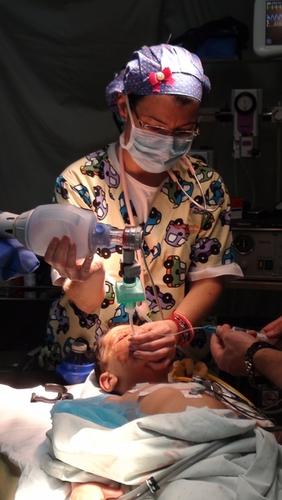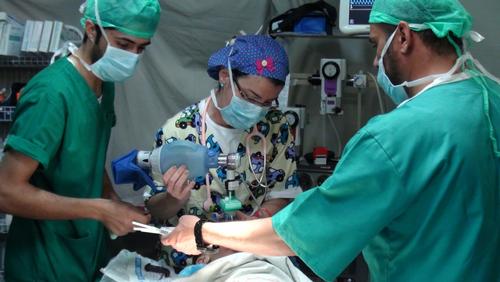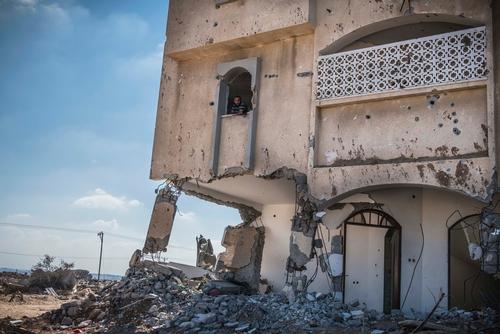Liliana Andrade, MSF anesthetist, talks about the difficulties in treating victims of bombings, with wounds that can cover the whole body and might involve multiple other occurrences, like fractures, crushing and burns
It´s been nearly four years since Liliana Andrade, 39, started dedicating her vacations to the practice of humanitarian work with Médicins Sans Frontières (MSF). The anesthetist was part of projects in countries like Pakistan, Democratic Republic of Congo, Haiti and South Sudan. Working in armed conflict zones was no news for her, but her second mission in Gaza, amidst one of the most violent conflicts nowadays, was completely different from what she had experienced, both professional and personally. “Victims of bombing present wounds that are very different from what I have treated before. Huge parts of the body can be burned at once, there are exposed fractures, limbs crushed, traumas. Everything happens at once”, she says.
During her first mission in Gaza, the situation in the country was not good, but there was a kind of peaceful feeling rising up through the air, and MSF teams, just like other humanitarian organizations, had liberty to come and go wherever. This time, it was a different story. Liliana lived a mix of emotions throughout her mission, which lasted 55 days: moments of fear, specially in the night time while hearing bombs and explosions; anxiety, while hoping for the announcement of the next ceasefire; and pure happiness, after the announcement of the long-term and current ceasefire. “Everybody cried. We were very emotional for being there, in that exact moment. You can see what real happiness means for a whole population. It´s not like any other celebration; their lives were at stake”, she adds.
Back from Gaza in early September, Liliana tells a few moments of her most recent experience in the interview below.
What would you say has changed the most in the last two years in Gaza?
Although Gaza was always a dangerous place, I didn´t feel like that in the first time I was there, in 2012. In that occasion, I was working in a reconstructive surgery project in the southern region. Of course, there were security issues most related to the arrival in Israel, going through the border, but we could go out, movements were allowed. Now, it was house-hospital and hospital-house. Only after the last ceasefire we had permission to see the city. Most of the time, there were risks of explosions, the sound of bombs were frequent. If working concentrated in the patient ‘needs, inside the operating room with no windows, we could not hear a thing. However, at night, without much noise in the streets, every sound was clearly heard and identified. Emotional and psychological distress were huge from the moment I decided to take this mission with MSF. It meant, from the beginning, entering the war.
And what about the medical needs of the patients, when compared to the people you treated in other armed conflicts?
My experience in conflict zones was different. There were not bombs, missiles or rockets in the places I´d been. Nothing compares to a war explosion wound. Victims of bombing present wounds that are very different from what I have treated before. Huge parts of the body can be burned at once, there are exposed fractures, limbs crushed, traumas. Everything happens at once. I treated a girl with e femur fracture right next to the thigh root. The energy necessary to generate such injury is absurd; it takes a trauma extremely violent. A burned patient is already a lot of work and, with this kind of wounds, it would only get worse. It was really too much: someone would come to us burned, but also with the thorax wide open, in a way that you could see the ribs.

One thing is being there with MSF, knowing that our family and friends are safe. Another thing is going to work knowing your family is at risk. There were times, lots of times really, when a bunch of them couldn´t make it to work, due to insecurity. The medical coordinator himself had to take his family to the MSF compound, and he was very tense. A nurse, who has three young girls, lied to them constantly, turning on some music so they would not be able to hear the explosions, and telling them it was all part of a theatrical play, so they wouldn´t feel the reality. His story moved me.
Which are the security procedures for international staff?
We had to be together all the time, and wait for the MSF car. We could only move with permission. In the MSF house we were staying, there is a security room, where we went whenever there was bombing. I truly believe in MSF security procedures. The organization maintains a good relationship with both Israeli and Palestinian governments and we are very respected, which makes a big difference.
Was there any patient who has marked you the most?
The most emotional day for me was when I saw a patient that I treated back in 2012. Victim of an explosion at the age of 7 months, he was submitted to several surgeries when he was 3 years-old. Back then, I used to see him every day in the MSF reconstructive surgery program. In my last day there, I asked his mother to tell him, in English, that I was leaving. I got down on my knees, so that we could look right into my eyes, and he said “I love you, Lili”. Immediately, I started to cry. I had the feeling that I was never going to see him again. When I arrived in Gaza, I started asking for him and, one day, completely out of nowhere, I saw him waiting for me when I got back from the hospital. He said he remembered me and, of course, I was all emotional.
How was the experience of being there on the beginning and the end of several ceasefires?
When there was the expectation of a temporary ceasefire, medical teams were sent to work in the hospital normally, but prepared for an increase in the number of patients as soon as the peaceful period was over. There was an atmosphere of anxiety, of fear of what was to come. I don´t know if I´ll ever feel that again. We all hoped, as well as the whole population, obviously, for the announcement of a long-term ceasefire. And, when that happened, it was amazing. Everybody cried. We were very emotional for being there, in that exact moment. You can see what real happiness means for a whole population. It´s not like any other celebration; their lives were at stake.
Would you go back to Gaza?
Absolutely.





